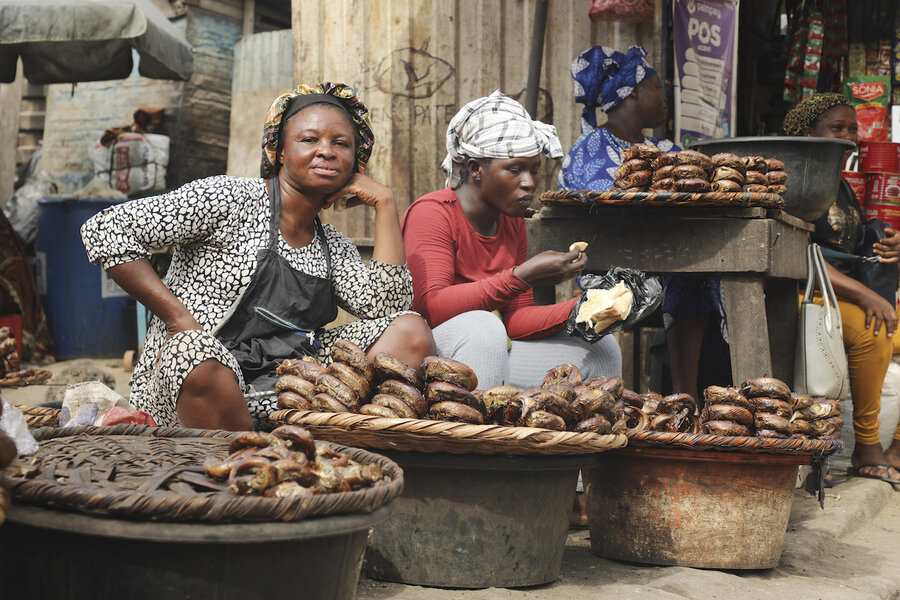Experts predict mid-year drop in consumer food prices

- Blame insecurity, interest rates, middlemen sabotage for prevailing high prices
- Lagos threatens to fine, shut supermarkets without products’ price tags
- Naira appreciation: We’re posting heavy losses, BDCs cry out
Economic experts are hopeful that the current high costs of goods and food will begin to drop by the end of the first half of this year.
Thank you for reading this post, don’t forget to subscribe!
But that is on the condition that the current momentum to energise the economy does not suffer any reversal.
A major player in the foreign exchange sector, the Association of Bureaux De Change Operators of Nigeria (ABCON), has appealed to the Central Bank of Nigeria (CBN) to lower the dollar selling rate to its members in view of the massive appreciation of the naira against the dollar and other international currencies while the Lagos State Consumer Protection Agency directed supermarkets and grocery stores in the state to display prices on their products or risk being fined or shut down.
A combination of factors including fuel subsidy removal, insecurity in parts of the country that has forced many farmers off the land and shortage of foreign exchange are said to be largely responsible for the high cost of living.
The naira, which exchanged for between N1,150 and N1,180 to the dollar as of December 31, 2023, crashed to N1,400 in January and further depreciated at the black market to N1,950 in mid-February with many speculating that it could get worse. But the naira experienced a good fortune by the middle of March following a raft of policy initiatives by the apex bank to improve the transparency and inflows of the FX market.
However, the appreciation of the naira is yet to reflect on the prices of commodities as the market has not fully adjusted to the current realities in the FX crash.
Investigation by our correspondent across major markets, chain stores and retail outlets in parts of Lagos and other parts of the country, revealed that the prices of major commodities are yet to reflect the gains of the dollar crash.
The prices of perishable agricultural produce such as vegetable crops, grains, maize, wheat, bread, beverages, and fizzy drinks have shot up astronomically.
A market survey conducted by our correspondent showed that some brands of soft drinks packaged in pet bottles, which hitherto sold for N300 per unit from January till late February are now being sold at N350, while some of the branded malt drinks sell at N450, up from N400.
Some of the chain stores in Lagos and parts of Ogun State are not helping matters in the pricing of goods.
Some of them were found to change prices indiscriminately. There were instances when they altered prices of goods already displayed on their shelves within 24 hours.
Speaking to The Nation, Kabir Ibrahim, National President of the All Farmers Association of Nigeria (AFAN), said it was rather scandalous that the prices of commodities were not yet reflective of the gains recorded with the naira against the greenback.
“Ideally, if the Naira is firming up, the prices of all goods should come down and should show the increase in the strength and purchasing power of the Naira,” he said.
He added: “If prices are not coming down, it’s either that the whole thing is artificial or there is lack of education on the whole matter or there is fraud in it because that’s why we kept saying that some of these items should not be dollarised.”
Ibrahim, who is the Managing Director/Chief Executive Officer of Kebram Agritrade Limited, cited the price trajectory with some of the locally-sourced goods.
His words: “I recall talking about the price of cement the other day during a guest appearance in one of the national televisions, and I said that the price was unreasonably high because 80 per cent of the components are not bought with dollars.
“Today, cement in Abuja is sold everywhere at N7,500. That price is reflecting on the increasing strength of the Naira. Now again, if you go to the price of reinforcement steel, it is also coming down.
“So if the prices of rice and other food items are not coming down, it only means one thing: an act of sabotage. It is not the fault of the farmers that don’t have any of those commodities to sell now; it’s the middlemen and businessmen.”
The AFAN boss is however optimistic that once the farmers are able to farm during this season and reap bountiful harvests, this may have a positive impact on the supply of food for the rest of the year.
“You know the farmers have sold off all they had. In fact, the harvest season is off, we are now getting into the raining season. So, we have really got nothing to sell as such.
“Therefore, the government should now concentrate on the middlemen, the people who buy and hoard these items and bring them out in order to cause artificial scarcity. So, that is what we should concentrate on; not farmers.”
Echoing similar sentiments, Peter Sunday Adebola, the Managing Director Edgefield Capital Management Limited, an investment-driven company, said several factors may be at play and could possibly be fueling the soaring cost of commodities thus far.
Adebola, who also tied the high cost of goods to the nefarious activities of unscrupulous businessmen and middlemen deliberately sabotaging government efforts, said they are escalating the lingering food crisis.
“When we look at the components or the factors that are affecting the prices of commodities in the market, I want to believe that it is not only the exchange rate. Exchange is just one of the factors affecting the prices of commodities in the market,” he said.
The technocrat who heaved a sigh of relief that the planting season is here, said it was rather heartwarming to note that the government is making good efforts to end banditry in food producing areas.
“Hopefully, as we are getting to the middle of the year, we are supposed to see critical changes in the prices of commodities in the markets. By then, the prices would become moderate, even the imported food items would also come down since the exchange rate is going down.”
He was however quick to admit that there should be cautious optimism with the gains of the naira, noting that those managing the economy should not relent in their current efforts.
In the view of Prof. Abel Ogunwale, a professor of Agricultural Extension and Rural Development at the Ladoke Akintola University of Technology (LAUTECH), Ogbomosho, Oyo State, insecurity is at the heart of the matter of the food crisis in the country today.
“Whether it is Oyo, Ekiti, Ondo, Osun, Edo, Kogi, Delta, Benue, Kaduna, Taraba, Borno, Nasarawa, Zamfara, Sokoto, Anambra, Enugu, Imo, or any other part of the federation, farmers have not only become an endangered species but have abandoned their farms, no thanks to the lingering problem of insecurity they confront on a daily basis.
“We have major problems hindering our food security from four perspectives. One is the issue of security threats vis-à-vis the situation in the Benue, Zamfara, Jigawa, Borno, Adamawa axis and even the borderline between Nigeria and Cameroon, and the other aspect is the Nigeria and Niger Republic issue,” he said.
The insecurity, he maintained, is as a result of the Boko Haram insurgency in parts of the north. “We have a lot of insurgency activities affecting those areas,” he said.
For Benedict Uwajue, a public affairs analyst, a combination of factors may be responsible for soaring food prices.
He said: “Unlike unscrupulous business elements in the society, if the woman selling vegetables she got at her backyard for N400, with the rate of transportation, if she still sells at N400, how would she take care of herself? Buy food, buy firewood or gas. Kerosene is more expensive than gas now.”
The cost of fuel, Uwajue argued, has major effects on businesses.
“Until energy becomes affordable and readily available, exchange rates won’t significantly affect the cost of goods in the market,” he maintained.
Lagos orders stores to display prices of goods
The Lagos State Consumer Protection Agency yesterday directed supermarkets and grocery stores in the state to display prices on their products or risk being fined or shut down.
The agency, in a public notice posted on the website of the Lagos State Government, warned supermarkets and grocery stores in the state against non-disclosure of price tags on products.
It said its warning was meant to “ensure transparency and protect consumers from potential price exploitation as non-disclosure of price tags can lead to misunderstandings and inconvenience at the point of sale.”
It said absence of price tags is a violation of consumer rights and the Lagos State Consumer Protection Agency Law, stressing that without clear price tags, shoppers could not compare prices or make informed choices about their groceries.
ABCON to CBN: Reduce expensive dollar rate for BDCs
The Association of Bureaux De Change Operators of Nigeria (ABCON) in a letter to the apex bank said N1,251/$ rate sold to BDCs has become too expensive for operators following the massive appreciation of the naira against the dollar and other world currencies.
National President of ABCON, Dr. Aminu Gwadabe who signed the letter addressed to the CBN Director, Trade & Exchange Department claimed that naira’s speedy recovery, which was faster than expected, had made CBN’s selling rate to BDCs very expensive and difficult to offload to retail end buyers that are trooping to the undocumented forex operators for cheaper rates and avoiding the BDCs services
It expressed concerns that many BDCs which funded their accounts for dollar allocations were yet to receive their allocation of dollars to meet up the legitimate critical demand of their clients due to scrutinization of the BDCs documents for collections at the various designated centres which invariably made the BDCs vulnerable to exchange rate risk and significant loses.
The group insisted that with naira appreciating across markets, many BDCs which bought dollar at N1,251/$ would lose significant income and capital should they sell at the current open market rate of N1,235/$ and therefore the need for the call for a further review downward of the applicable exchange rate for the period and subsequently to continue to enhance naira sovereignty.
“We discovered a worrisome development where many of our members who paid for dollar allocations at N1,251/$ with a margin of 1.5% are yet to receive their disbursement. This is happening in the face of prevailing open market rate of N1,235/$ which is lower than the authorised applicable exchange rate by the CBN to the BDCs,” ABCON said.
The request is coming in the midst of the epoch history making achieved by the apex bank for the first time in the last 15 years for the unofficial market rates at N1,235/$ to be lower than the official BDCs applicable buying exchange rate of N1,251/$ (plus 1.5 per cent margin) set for the BDCs by the CBN in its latest tranche of intervention.
Despite this development, ABCON lauded the CBN leadership for the recall of BDCs into the official FX window and steps taken by the apex bank to strengthen the naira against the dollar and other global currencies.
ABCON said the positive fallout of the CBN’s efforts to restore naira’s glory came faster than expected, reiterating its commitment to working with the apex bank to realise the objectives of government towards exchange rate stability and economic growth.
ABCON said its forecasts in the ongoing market development indicated a willingness of the market to correct itself with a realistic price discovery as naira is forecast to continue to appreciate further across market with the increasing sources of foreign exchange inflows aided by the CBN policies
“It is in view of the above market developments that we write to appeal to your good selves for a readjustments and review downwards of our funding rate of the last tranche (2nd bidding) from N1,251/$ further down to reflect current market rate discovery. This became imperative as it is only the consideration of the readjustment downward that will enable our members to upload their holding positions,” it said.
ABCON also requested that process of payments at the various disbursements centers be reviewed in the immediate time to a medium time automation to achieve enhanced timely payments while also observing the spot nature of our transactions.
The group further requested that based on the offer and acceptance rule, the approval of refunds to those that are yet to collect disbursement having funded their accounts as it is the market that determines the rate presently be considered going forward.
ABCON also requested that the apex bank introduce cut-off time for payments and collection of bids, adding that the current open ended system for payments and collection of bids does not make for effective administration and control of the process.
“Consequently, many of our members are jittery to bid/collect their bid for fear of losing money as the current market reality has the potential to force us to sell below cost price and antithetical to recent market price discovery,” the group said.




